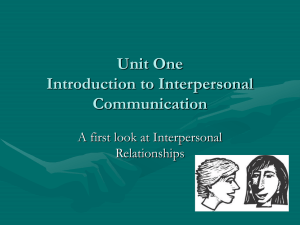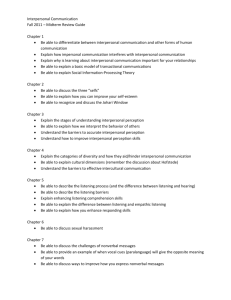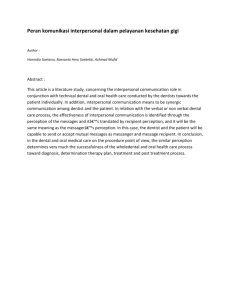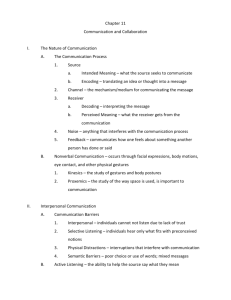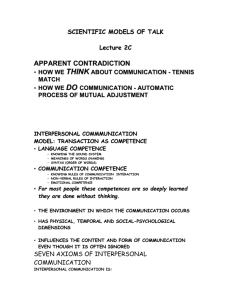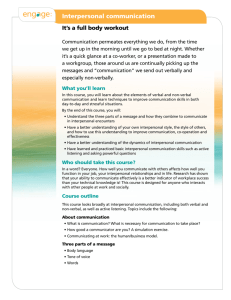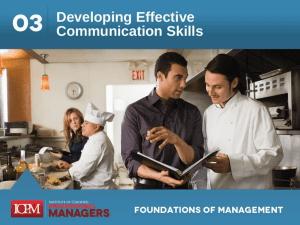interpersonal_communication_competence_reflection
advertisement
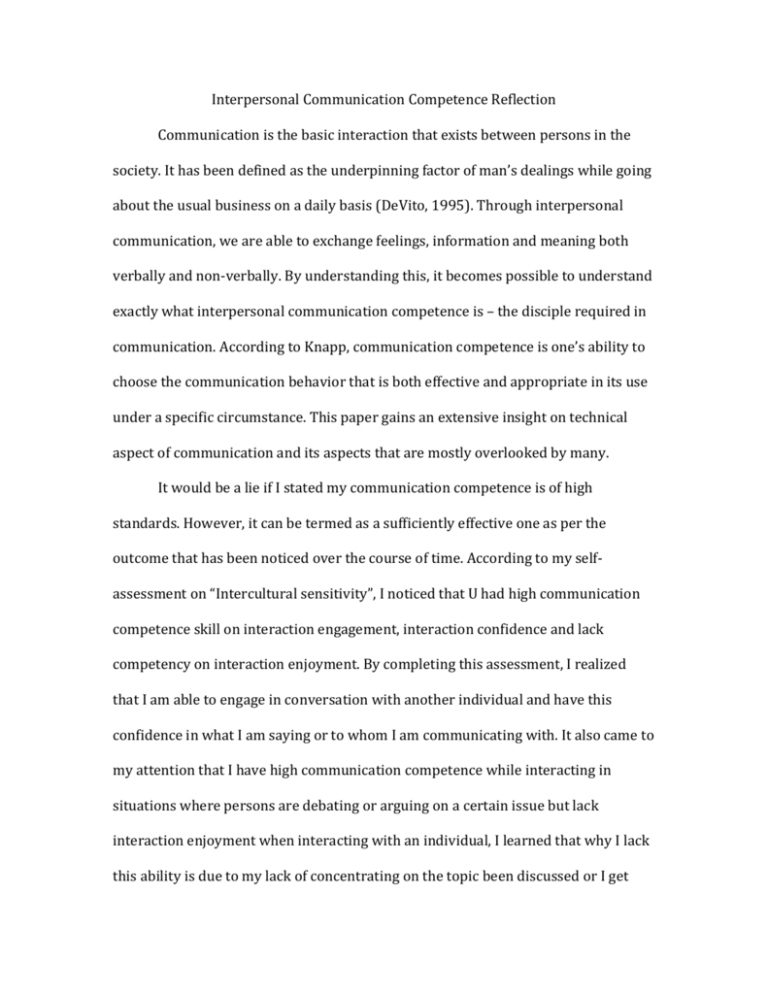
Interpersonal Communication Competence Reflection Communication is the basic interaction that exists between persons in the society. It has been defined as the underpinning factor of man’s dealings while going about the usual business on a daily basis (DeVito, 1995). Through interpersonal communication, we are able to exchange feelings, information and meaning both verbally and non-verbally. By understanding this, it becomes possible to understand exactly what interpersonal communication competence is – the disciple required in communication. According to Knapp, communication competence is one’s ability to choose the communication behavior that is both effective and appropriate in its use under a specific circumstance. This paper gains an extensive insight on technical aspect of communication and its aspects that are mostly overlooked by many. It would be a lie if I stated my communication competence is of high standards. However, it can be termed as a sufficiently effective one as per the outcome that has been noticed over the course of time. According to my selfassessment on “Intercultural sensitivity”, I noticed that U had high communication competence skill on interaction engagement, interaction confidence and lack competency on interaction enjoyment. By completing this assessment, I realized that I am able to engage in conversation with another individual and have this confidence in what I am saying or to whom I am communicating with. It also came to my attention that I have high communication competence while interacting in situations where persons are debating or arguing on a certain issue but lack interaction enjoyment when interacting with an individual, I learned that why I lack this ability is due to my lack of concentrating on the topic been discussed or I get distracted easily when an individual is trying to communicate with me. I learned that to be a good communicator, I need to improve on my interaction skills when it comes to enjoying the conversation and pay close attention to what is been said to me, I can do so by getting rid of outside distractions that can easily distract me. Also, my assessment on “how interpersonal are your relationship”, I realized that my relationship is interpersonal in different ways and how effectiveness and appropriateness is important in the way I communicate with individuals. Also, I learned that I have the ability to change my goals and motives to meet the needs of the people am communicating with, I also understood that in the way I communicate with people, I use verbal and non verbal cues to show my understanding to what an individual is saying to me. After the completion of this assessment, I realized that effectiveness and appropriateness both contributes in making me a good communicator and I had to learn on how to improve more on the way I communicate effectively and appropriately. When I completed the listening response, I learnt that in the way I listen and respond to individuals is different from what I thought, I used to think I am the supportive kind of listener whereby I show solidarity with the speaker’s situation but I realized that realized that I am the questioning type of listener. I use more of this skill when I listen to mostly my friends when they relate information to me; I like to clarify meanings, to learn about their thoughts, feelings and wants. I encourage them to elaborate more; I gather more facts and information in order to come up with a solution to their problems and also be the effective listener they want me to be. I managed to gain insight on the underlying factor that prompts me to exhibit this particular communication trait I have. It was somewhat surprising to know that each individual have different ways they view my communication skills, most people think I am the best communicator while most think I lack communication skills and I was able to learn that as individuals, we do have different ways we communicate with each other, I can define mine as very detailed, precise in the way I communicate with other individuals and tend to be an effective listener. In the course of time, I have been able to work more on the skills I was lacking as a competent communicator and most people have told me that they have seen a lot of changes with the way I communicate with people especially with people from a different culture. At the beginning of this course, I had three main goals that I hoped to achieve; the first goal was to improve my skills on my conversation management, my effectiveness and appropriateness. Conversation management: my goal was to be able to reflect my ability to regulate conversation through controlling the topic, adjusting to a change in topic, interrupting and asking questions, effectiveness: My ability to achieve the objectives during conversations and Appropriateness: this reflects my ability to uphold the expectations for a given situation by behaving in ways other people expects of me. Perception, active listening and the use of conflict management skills are concepts that have been found to be vital in relation to interpersonal communication. In interpersonal competence, perception checking has been helpful in improving my communication competence skills. Perception checking is a tool to help us understand others accurately instead of assuming that our first interpretation is correct. Perception checking is a cooperative approach to communication (Interplay, 131). By understanding perception checking, I have been able to make accurate assumptions without leaping to wrong conclusions. By using and understanding perception checking, I have been able to decode message more accurately, be able to understand the other party without much confrontation and also be able to avoid conflicts. It has helped my communication competence skill because I have been able to identify and describe the behavior I have noticed in an individual, provide interpretations of that behavior and get clarification of the behavior I have noticed. Listening is an important tool in communication competence. Listening is the process of receiving and responding to other’s messages (Interplay, 211). By understanding the act of active listening, I have been able to identify my poor listening habits and learn on how to improve on them. I understood reasons why I have these poor listening habits. It has helped in my communication skills because I have been able to apply the listening rule and it proved to people on how I have improve to be a better listener. Also, I found conflict management to be really interesting because I was able to learn more about conflicts, what leads to conflict, the different conflict styles and ways on how to manage these conflicts in our relationships. Been able to read and understand this concept, I have been able to improve more on how I resolve conflicts in my life especially in my personal relationships and it has helped in improving my communication competency skills with my husband because instead of just argue about making decisions, we just apply the rules and come up with solutions that best work with our needs. Personally, I have been incorporating perception checking, conflicts management and the “I” statements in any interaction process that is of importance. Nonetheless, perfection makes perfect and the more one gets accustomed to using the concepts, the better he or she becomes an effective and competent communicator. In my case, I have used the three steps of perception checking in my everyday activities. The three steps I have used are: a description of the behavior I noticed, two possible interpretations of the behavior and a request for clarification. Example of a situation where I practiced this skill was at the office. I got to work and greeted my director, she didn’t respond, she seemed upset about something, she had a call and I transferred it to her as the client wants to speak with her urgently, she got all upset with me and yelled, I tried explaining to her but she wouldn’t listen to whatever I had to say to her. I walked away angrily and refused to even speak to anybody in the office. After sometime, I went to speak with her. I approached her calmly by stating her behavior I noticed, gave her two interpretations of her behavior and requested for clarification. She apologized and told me she was upset about something else and she was really having a bad day. By using this skill, it made the environment conducive for all of us. “I” statements- this is a statement I have learned how to use in my life and I will continue to use this because it provides a more accurate and less provocative way to express how I feel. I use this statement in expressing my thoughts, feelings and wants. Example: Each time my husband and I hang out with our friends, he usually embarrass me in front of them, I don’t know if he does it out of fun or just intentionally and it irritates me a lot. Most of the time, I feel like not going out with him because of they way he acts around our friends. I was able to express how I felt by using the three parts of the “I” statement to describe how I was feeling. First, I described his behavior, my feelings and consequences of his behavior towards me. Also, conflict management was an interesting topic because it explains how conflicts generates, the different conflict styles and ways n how to manage conflicts. I have tried the conflict management skills and I have found it to be very useful in resolving conflicts in my relationship with people around me. Example of using this skill was when I was faced with a situation resulting from my husband and I not deciding on where to take the kids. It brought so much disagreement between us that we had to just stay way from each other for couple of hours. When the situation became calm, I used the seven-conflict management in practice skills. Firstly, we both define our needs with each other, evaluate the solutions we came up with, implement it and follow up with it. Right now, we are still using this skill and it has really improved the way we communicate with each other. According to the feedback that I have received from my friends, I have a high chance of facing many challenges in my communication due to my self-concept that is often too strong. This means that I have to work on it and reduce the rate and manner in which I incorporate the “I” factor in my communication. What I also find difficult is been able to apply the rule of silent listening because I tend to interrupt people and ask questions while communicating or interacting with people which appears to be rude and shows lack of competency in my communication skills. Interaction confidence will also be difficult because I don’t know how to be so confident in interacting with people especially people I hardly know and people from different cultures. I don’t fell so confident speaking with people from different culture due to the way I speak (my accents), I feel they won’t be able to understand me. Communication is important and beneficial to man, effective communication is even better. This is due to the numerous benefits that it has in the workplace, schools and the society at large. Its main benefit is the improved understanding that will exist between the two persons interacting. As a result, issues can be run smoothly without much misleading or misconceptions. , There will also be a mutual respect among those who communicate effectively. With effective communication, persons in a relationship are able to avoid uncalled arguments that eventually lead to detrimental effects. Conclusively, the main lessons that I have depicted from the teachings on effective communication are that it is essentially an art that ought to be approached and dealt with artistically. It is beneficial to incorporate each of the concepts and aspects that contribute to making one a competent communicator. A brief advice to all is that communication is the only way that we can get along well; it is beneficial when we are effective and competent in its regard. Reference DeVito, J. (1995). Interpersonal Communication. New York: Hasper and Rew. Knapp, M & Daly, J. (2002). Handbook of Interpersonal communication. Sage. Ronald, B. Alder. Interplay: The process of Interpersonal Communication

